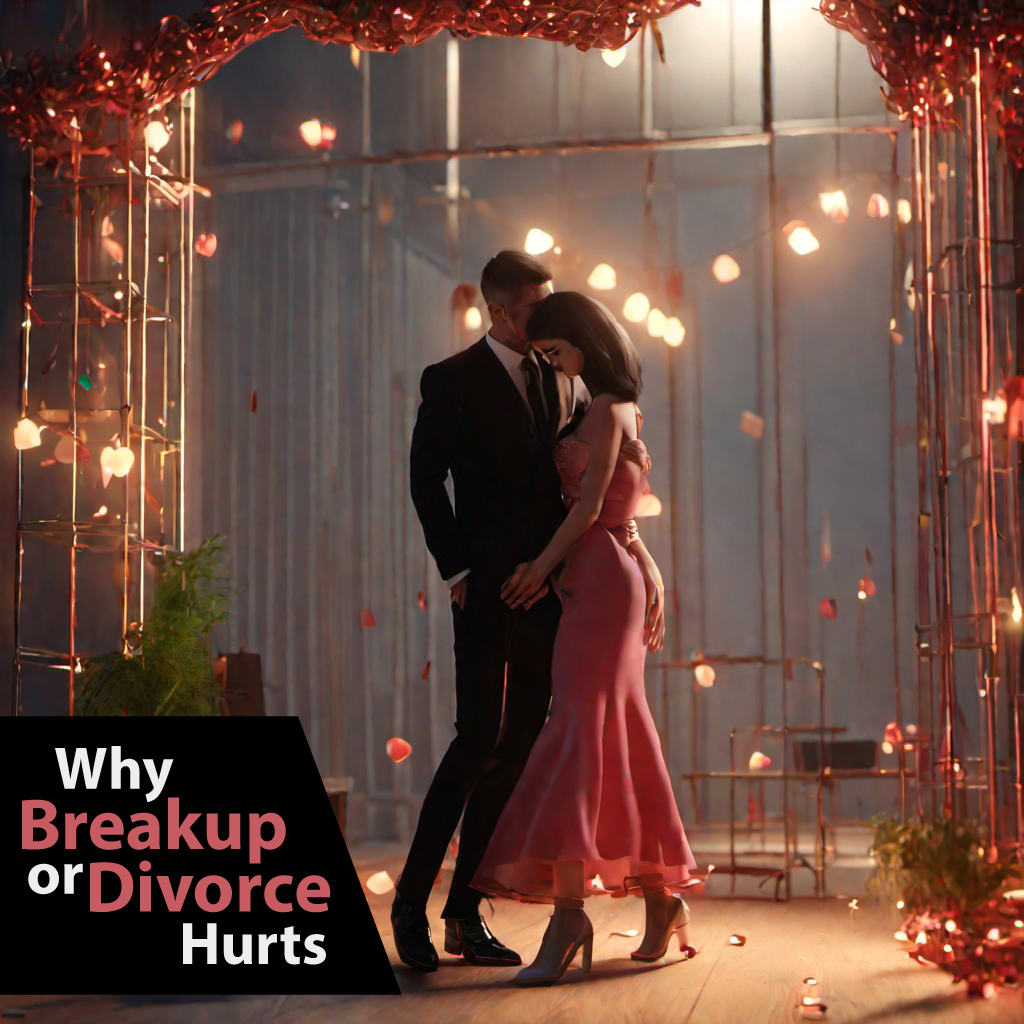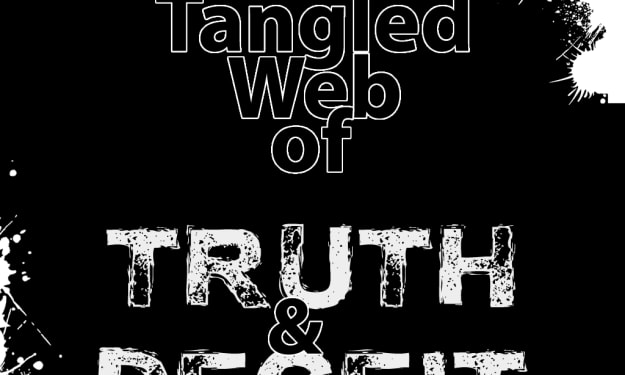Why Breakup or Divorce Hurts
A graceful approach to finding harmony in existence post-marriage

Navigating and finalizing a marriage constitutes a complex journey that encompasses emotional, psychological, and physical dimensions. The recollection of physical intimacy with a partner amplifies distress across all facets of one's being. This impact isn't limited to emotions alone; it manifests physically too. Finding harmony in existence post-marriage presents itself as a formidable challenge, demanding a graceful approach.
“I am going through a divorce and it feels like a part of me is dying. How can I overcome this pain and move forward with life?”
You encompass a complete repository of memory, a culmination attributed in part to the genetic memory you bear. Your physique's entirety finds explanation within the memories it houses. The nose resembling your mother, the complexion inherited from your father, and those subtler traits passed down from your grandfathers - all elements of what constitutes your body result from this confluence of memories. Embedded within your physical form lies an ancient memory, its presence enduring through time. Even your mental realm, what you identify as "my mind," presently comprises an exclusive compendium of memory. Essentially, you exist as a conglomerate of memories, a rich tapestry woven from diverse sources. These memories infiltrate you through your five senses, shaping your essence. Visual stimuli, auditory experiences, scents that waft your way, flavors that grace your palate, and the tactile sensations under your fingertips—all channel memory into your being. Amid these varied conduits of memories, the most profound resonance emerges from what you perceive visually and what you physically touch, unfurling as the deepest strata of remembrance.
Every touch leaves a distinct imprint within the system, so when you mention 'a spouse, whom you have physically interacted with,' there exists a particular reservoir of memories associated with them in the present moment. The intertwining of two individuals who have openly shared their feelings, their physical presence, their sensations, and their living spaces results in the fusion of two distinct sets of memories. To dismantle this connection is akin to tearing oneself to asunder, given the multifaceted ways in which these memories have intertwined. Undeniably, this process is laden with difficulties for a multitude of reasons. Simultaneously, the very act of undergoing a divorce signifies a desire to find closure with those accumulated memories in some manner. Perhaps not to erase them entirely, but to relegate the person who was once a spouse, a significant partaker in various aspects of your existence. Gradually, due to various factors, you have reached a point where you view these memories as a burden too heavy to bare. You yearn to cast aside this emotional baggage, yet frustratingly discover that it clings relentlessly. Attempting to forcibly sever this compulsive attachment is inevitably accompanied by anguish. Despite nearing a threshold where the presence of that individual becomes insufferable, the process remains painful, as you endeavor to extract a memory that is inherently a part of you—a cluster of recollections intricately woven around your spouse. Letting go isn't a simple task, for these memories have amassed into an intricate tapestry that cannot be unraveled in an instant.
Even when you find yourself emotionally and psychologically well-equipped to cope with the situation, it's inevitable that the entire system will undergo a certain degree of suffering. This phenomenon holds true regardless of your balanced state of mind. The experience takes on a distinct trajectory, especially in situations where you're separated from your spouse due to various circumstances, including death. The absence of their presence accentuates the prominence of memories within you, a sensation that becomes even more pronounced in the wake of death. These memories, intricately intertwined with your spouse, exert their influence over every cell within your body. This influence extends far beyond the realms of emotions and psychology; it's a profound physical ordeal, particularly if you've shared an extensive period of your life together. Consequently, divorce, in essence, is a self-imposed form of indebtedness to this intricate interplay of memories and experiences.
You've made the decision to terminate a facet of yourself in some manner. This rationale underscores the wisdom behind the age-old commitment of "till death do you part." This vow acknowledges that due to the deeply embedded physical memory associated with a partner, the body doesn't possess the equilibrium of the mind. While the mind can opt for change and reversal, the body remains bound to its established patterns. As memories accumulate within, the body's response grows increasingly muddled. Different types of memories are processed with varying degrees of effectiveness. Given your choice to pursue a divorce, the body's capacity to manage this transformation is tested. Ideally, avoiding such a circumstance would be optimal. However, events have transpired that have led you to this juncture. It's crucial to recognize that divorce essentially entails the deliberate relinquishment of a fragment of yourself, as the essence of "self" is fundamentally a culmination of memories. The imperative now lies in understanding how to navigate this process with grace and sensitivity.
Many individuals believe that the most effective approach to manage a divorce is to hastily transition into another relationship of similar nature. However, this course of action can exacerbate internal struggles and conflicts. It is of utmost significance to provide the body with ample time to process the memory associated with the previous relationship, allowing it to distance itself gradually. Failing to do so might propel you into a realm where attaining inner peace and joy becomes an arduous feat. Handling this process with grace and prudence is as pivotal as approaching every facet of life similarly. When you choose to divorce a spouse, it doesn't necessitate divorcing yourself, but it's crucial to comprehend that, in a way, you've already created a separation within yourself. Your very existence has been shaped through the establishment of bonds, partnerships, or even attachments, often driven by a desire to feel complete. Such alliances typically emerge from a sense of inadequacy or incompleteness within oneself, even though life in its entirety is a self-sufficient journey. At this juncture, as you find yourself confronted with this circumstance, the time has come to introspect and turn inward. Recognize that you are currently undergoing one divorce, a situation that might have been averted, yet it has transpired. Amid this turbulence, it's essential not to estrange yourself from your core essence. When I refer to "yourself," I'm not alluding to the memory-collecting aspect, but rather the fundamental bedrock of your existence. It's imperative not to drift apart from this integral essence. Instead, embrace the opportunity to rediscover the holistic essence of life itself.
The time has come for you to recognize that your being is inherently whole and self-sufficient. It doesn't rely on external influences to shape its essence or navigate the complexities of life within society. While acknowledging the interdependence that societal life demands, it's crucial to internalize that at its core, your existence, the equilibrium it maintains, the expansive realm it encompasses, and the potentials it holds, constitute a self-contained and comprehensive process. Interdependence manifests primarily to fulfill external needs, whereas your inner essence thrives as a self-contained entity. Amid the process of divorcing your spouse, a challenging endeavor in itself, it's imperative not to sever the connection with your own fundamental self. This intrinsic bond should never be broken, for it's a cornerstone of your being.
Absolutely refrain from divorcing yourself from your own essence, under any circumstance! Life consistently offers opportunities for growth and progression, and the path forward is the sole avenue through which you can forge fresh memories while diminishing the prominence of the past ones. Although remnants of those former memories might resurface intermittently, their emotional weight will gradually dissipate compared to the intensity experienced during their inception in your consciousness.





Comments
There are no comments for this story
Be the first to respond and start the conversation.